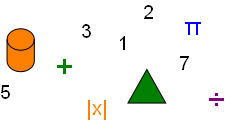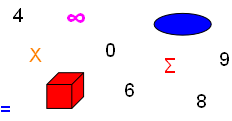



Factorials and
Binomial Expansion


Factorial Quotients for Binomial Expansion
The primary interest of advanced factorial math is to understand a systematic way to determine the positive integral powers of a binomial, a + b. The following computations are important to understand expanding powers of a + b:
(
n
0
)
=
(
n
n
)
=
n!
0! n!
=
1
1
=
1
Need to review factorial basics?
If so, then click: Understanding Factorials
(
n
1
)
=
(
n
)
=
n!
1! (n − 1)!
=
n (n − 1)!
1! (n − 1)!
=
n (n − 1)!
(n − 1)!
=
n
(
2
1
)
=
2
(
3
1
)
=
(
3
2
)
=
3
(
4
1
)
=
(
4
3
)
=
4
and so on.
(
4
2
)
=
4!
2! 2!
=
4 × 3
2 × 1
=
6
(
5
2
)
=
(
5
3
)
=
5!
2! 3!
=
5 × 4
2 × 1
=
10
and so on.
Now we consider the following powers of a + b:
(a + b)0 = 1 =
(
0
0
)
a0 + b0
(a + b)1 = a + b
=
(
1
0
)
a1b0 +
(
1
1
)
a0b1
(a + b)2 = a2 + 2ab + b2
=
(
2
0
)
a2b0 +
(
2
1
)
a1b1 +
(
2
2
)
a0b2
(a + b)3 = a3 + 3a2b + 3ab2 + b3
=
(
3
0
)
a3b0 +
(
3
1
)
a2b1 +
(
3
2
)
a1b2 +
(
3
3
)
a0b3
(a + b)4 = a4 + 4a3b + 6a2b2 + 4ab3 + b4
=
(
4
0
)
a4b0 +
(
4
1
)
a3b1 +
(
4
2
)
a2b2 +
(
4
3
)
a1b3
+
(
4
4
)
a0b4
(a + b)5 = a5 + 5a4b + 10a3b2 + 10a2b3 + 5ab4 + b5
=
(
5
0
)
a5b0 +
(
5
1
)
a4b1 +
(
5
2
)
a3b2 +
(
5
3
)
a2b3
+
(
5
4
)
a1b4 +
(
5
5
)
a0b5
For each (a + b)n expansion:
- There are (n + 1) terms,
- The exponents of a decrease by 1 and the exponents of b increase by 1 for each subsequent term,
- The sum of the exponents of a and b in each term is n,
- The coefficient of an − i bi is:
This pattern continues for larger values of n and is the Binomial Expansion Formula:
(a + b)n =
(
n
0
)
anb0 +
(
n
1
)
an − 1 b1 +
(
n
2
)
an − 2 b2
+
. . .
+
(
n
n − 2
)
a2bn − 2
+
(
n
n − 1
)
a1bn − 1
(
n
n
)
a0bn
The coefficients
(
n
i
)
are binomial coefficients.
The Binomial Expansion Formula can be stated using Summation Notation:
(a + b)n =
n
Σ
i = 0
(
n
i
)
an − i bi
Copyright © DigitMath.com
All Rights Reserved.